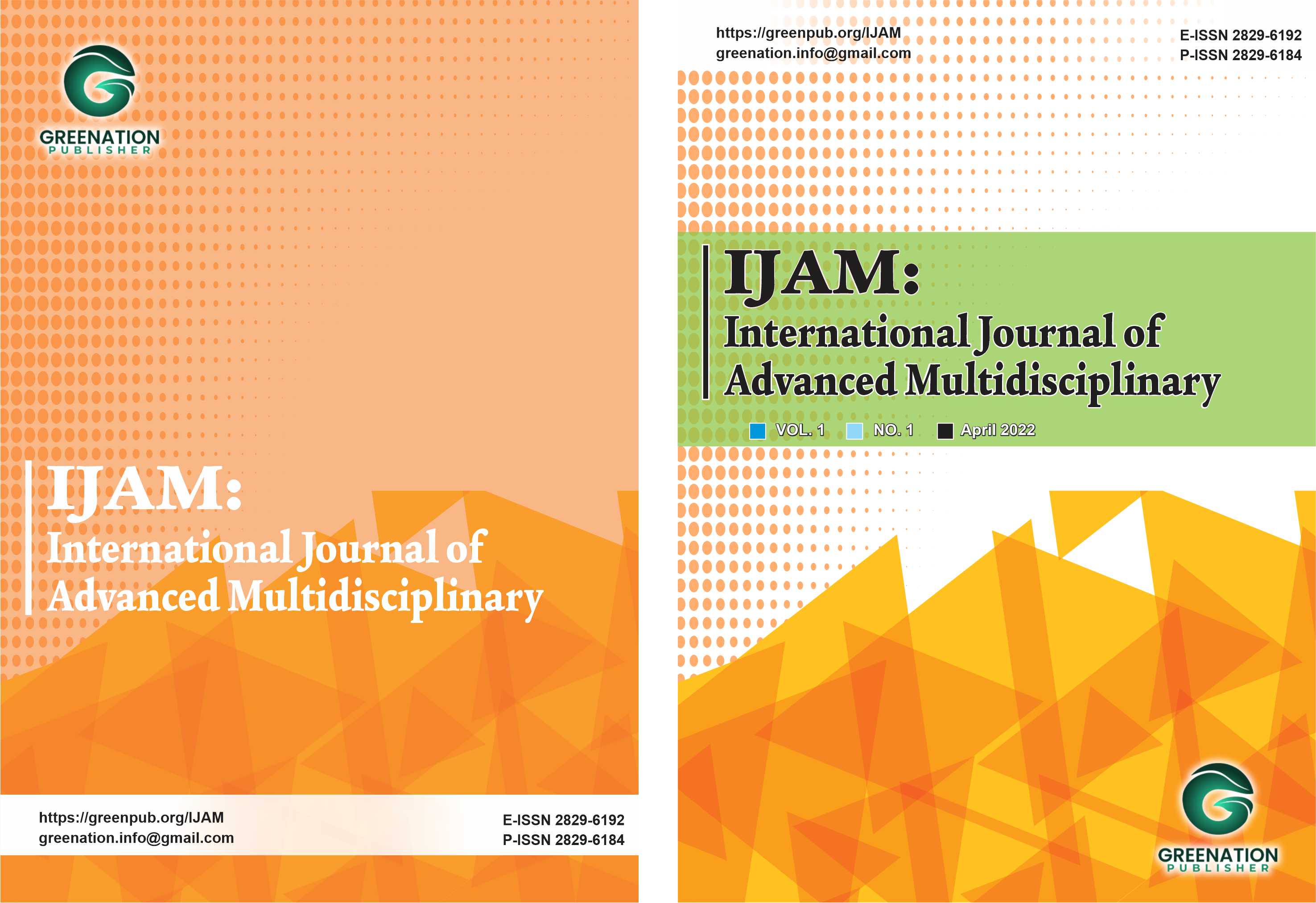Application of the Inquiry Learning Model to Improve Student Learning Outcomes in the Subject of Islamic Religion and Moral Education in East Tanjung Jabung 9 Public Junior High School
DOI:
https://doi.org/10.38035/ijam.v2i1.213Keywords:
Application of the Inquiry Learning Model, Student Learning Outcomes, Islamic Religious Education and CharacterAbstract
This study aims to examine student learning outcomes in applying the Inquiry Learning model to Islamic Religious Education Class VIII subjects at East Tanjung Jabung 9 Junior High School. This research is a qualitative research with a qualitative descriptive approach method. The low student learning outcomes for the lessons given by the teacher at school is an example that the completeness of learning outcomes has not reached the maximum point or has not been successful. This requires changes in teachers, especially in organizing classes, choosing appropriate teaching methods, teaching and learning strategies, as well as the attitudes and characteristics of teachers in managing the teaching and learning process in the classroom. The application of the Inquiry Learning model for Islamic Religious Education and Moral Education subjects at Tanjung Jabung Timur 9 Public Junior High School is effective in increasing student learning outcomes because it creates active interaction and participation not one way, students seek, find, ask questions, conclude. the learning activities use systematic steps of the Inquiry Learning method, namely a) Formulating problems, b) Submitting hypotheses, c) Collecting data, d) Testing hypotheses based on the data collected, f) Making conclusions.
References
Alam, Syamsir. “Merdeka Belajar dan Mutu Pendidikan,” Media Indonesia 114, no. 4 (Mei 2020): 63, https://mediaindonesia.com/opini/311863/ merdeka- belajar-dan-mutu-pendidikan.
AR, Muhammad. Pendidikan Di Alaf Baru: Rekonstruksi Atas Moralitas Pendidikan. Jogjakarta: Primasophie, 2003.
Creswell, W, John. Penelitian Kualitatif & Desain Riset: Memilih diantara Lima Pendekatan. Yogyakarta: Pustaka Pelajar, 2015.
Djamarah, Bahri, Syaiful. Psikologi Belajar. Jakarta: Rineka Cipta, 2002.
Endarti, Arief. “Penerapan Metode Pembelajaran Inquiry Untuk Meningkatkan Hasil Belajar dan Sikap Siswa Pada Mata Pelajaran Boga Dasar Kelas X-JBG-SMK N 4 Yogyakarta.” Skripsi, Universitas Negeri Yogyakarta,Yogyakarta, 2016.
Gulo, W. Strategi Belajar Mengajar. Jakarta: Grasindo, 2002.
Hanafiah, Nanang. Konsep Strategi Pembelajaran. Malang: Rafika Aditama, 2004.
Hayat, Najmul. “Strategi Pemasaran Jasa Pendidikan dalam Meningkatkan Citra Sekolah”. Paramurobi: Junal Pendidikan Agama Islam 114, no. 4 (Juni 2022): 20, https://ojs.unsiq.ac.id/index.php/paramurobi/ article/view/2717.
Kaelan. Metodologi Penelitian Kualitatif Interdisipliner. Jogjakarta: Paradigma, 2012.
Kemendikbud. Merdeka Belajar: Pokok-Pokok Kebijakan Merdeka Belajar. Jakarta: Makalah Rapat Kordinasi Kepala Dinas Pendidikan Seluruh Indonesia, 2019.
Mukhtar. Metode Praktis Penelitian Deskriptif Kualitatif. Jakarta: Referensi, 2013.
Muktar. Metode Penelitian Deskriptif Kualitatif. Jakarta: Gaung Persada Press Group, 2013.
Mulyasa. Apa itu Pedagogik . Jakarta: Grasindo, 2013.
Mulyono. Strategi Pembelajaran Menuju Aktifitas Pembelajaran Di Abad Global. Malang: UIN Maliki Press, 2011.
Murwanta. “Upaya Peningkatan Hasil Belajar IPA dengan Strategi Pembelajaran Inkuiri pada Siswa Kelas IV SD Negeri Merdikorejo Tempel Sleman Tahun Ajaran 2012/2013.” Skripsi, Universitas Negeri Yogyakarta, Sleman, 2019.
Nazir, Moh. Metode Penelitian. Bogor: Ghalia Indonesia, 2011..
N. R. Nurfuadah. “Perbedaan KTSP dan Kurikulum 2013,” Dunia Kampus 114, no. 4 (Desember 2014): 65 Https://News.Okezone.Com/Read/2014/12/08/65/1076314/Perbedaan-Ktsp-Dan Kurikulum-201.
Priatmoko, Sigit. “Persprektif Asesmen Autentik sebagai Alat Evaluasi dalam merdeka belajar.” Pendidikan Guru Madrasah 4, no. 1 (Maret 2021): 53. https://core.ac.uk/download/pdf/322523218.pdf.
Purwanto. Metodologi Penelitian Kuantitatif. Yogyakarta: Pustaka Pelajar, 2012
Sevina, Mayang, Seprila. “Apa itu Pedagogik,” Dunia Kampus 3, no. 4 (Juni 2022): 3-6, https://sevima.com/apa-itu-pedagogik-pengertian-kompetensi-tujuan-aspek-manfaatfungsi/https://www.duniadosen. com.
Sudjana, Nana. Media Mengajar. Jakarta: PT. Sinar Aglosindo, 2001.
Sugiono. Memahami Penelitian Kualitatif. Bandung: Alfabeta, 2013.
Sugiyono. Metode Penelitian Pendidikan Pendekatan Kuantitatif, Kualitatif, dan R & D. Bandung: Alfabet, 2014.
S, Sukiman. Menjadi Orang Tua Hebat. Jakarta: Kementerian Pendidikan Dan Kebudayaan, 2016.
Syah, Muhibbin. Psikologi Pendidikan Dengan Pendekatan Baru. Bandung: Remaja Rosdakarya, 2007.
Uno, B, Hamzah. Belajar Dengan Pendekatan PAIKEM. Jakarta: Bumi Aksara, 2012.
Downloads
Published
How to Cite
Issue
Section
License
Authors who publish their manuscripts in this journal agree to the following conditions:
- The copyright on each article belongs to the author(s).
- The author acknowledges that the International Journal of Advanced Multidisciplinary (IJAM) has the right to be the first to publish with a Creative Commons Attribution 4.0 International license (Attribution 4.0 International (CC BY 4.0).
- Authors can submit articles separately, arrange for the non-exclusive distribution of manuscripts that have been published in this journal into other versions (e.g., sent to the author's institutional repository, publication into books, etc.), by acknowledging that the manuscript has been published for the first time in the International Journal of Advanced Multidisciplinary (IJAM).






















